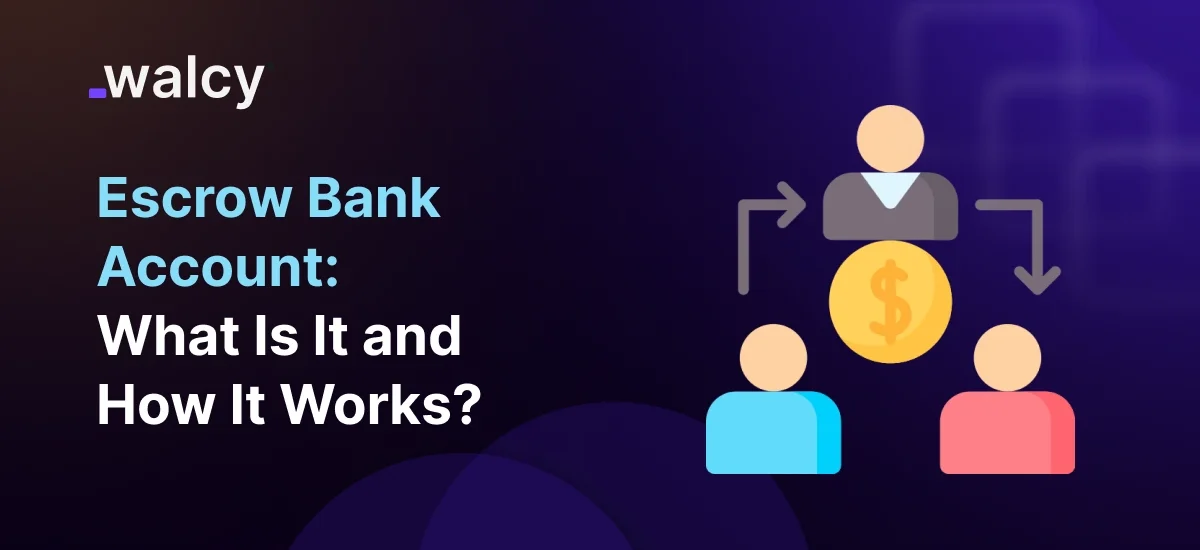What is an Escrow Bank account?
The escrow bank account is a form of financial setup wherein a bank or another type of escrow agent acts as the third-party holder of funds or assets between two or more parties until the transaction is consummated.
The escrow account holds the funds or assets until all parties in a contract have performed to the terms and conditions of the contract, then releases the funds or assets to the party they were intended for.
Escrow services are used in many industries, such as real estate, mergers and acquisitions, and business transactions, for protection against fraud or non-performance by either the buyer or the seller.
This account provides security and assurance for both parties of the transaction that no party is at risk.
Especially in cases of uncertainties and contingencies, it works to ensure that all conditions of the contract are agreed upon before the transaction is declared complete.
The Role of Escrow in Banking
Escrow in banking provides a very important tool for transactional security, wherein either the buyer or seller is kept away from accessing the money until the set conditions within the agreement are fully met.
In an escrow bank account, the bank may be used as a neutral intermediary that holds and disperses funds or assets upon the fulfillment of specified conditions.
Read about: Online Payment Security: Best Practices to Keep Your Transactions Safe
This can be applied to several scenarios:
-
Real Estate Transactions:
An escrow account holds the deposit by the buyer and the complete purchase price in regard to real estate transactions until the terms of sales are consummated.
The money is released upon the realization of the closing process. This may be upon clearance of the title, complete property inspection, and approved loan.
-
Business Transactions:
An escrow account can be used in business transactions, such as mergers and acquisitions, wherein the funds are held until certain conditions such as regulatory approvals, due diligence, or performance guarantees are met.
-
Online Transactions:
Escrow services in e-commerce or online services protect buyers and sellers against fraud.
The payment is only released to the seller when the buyer receives the goods or services as agreed upon.
In all these, the bank acts as a trusted third party to hold the assets until the set conditions materialize.
This adds security for both parties, reducing the risk of fraud and making the process of transacting easier.
Read about: Top Online Payment Methods Across The World.
Escrow Business Account
The account referred to as an escrow business account is a type of account opened by businesspeople to handle money belonging to others while awaiting some pre-specified conditions.
The escrow business account would be involved in business dealings where, for instance, one company is paid but pays the amount into an escrow pending when the delivery of service or goods would have been done by another company.
These accounts are usually used in the business to avoid such risks as non-payment, late delivery, or non-observance of the contract conditions.
Escrow business accounts find extensive application in many industries: real estate, construction, and online marketplaces, among others, stand for the protection of both parties in a transaction.
The main advantage of using an escrow business account is that it introduces some kind of transparency into the transaction, developing a level of trust in business transactions.
A third-party intermediary, usually a bank, sees to it that both parties fulfill their responsibilities before funds are exchanged, thus preventing disputes and protecting the integrity of the transaction.
Read about: 5 Best International Business Accounts | Open From Anywhere
Bank Escrow Services
Bank escrow services are provided by banking institutions to offer a safe way of holding and transferring funds between parties.
Normally, the services involve the bank acting as an independent third party to hold funds or assets while the terms of an agreement are being met.
Escrow services can be applied to a wide range of transactions, including:
-
Real Estate Transactions:
Banks provide escrow services for maintaining the deposit of a buyer and the total purchase price with respect to real estate transactions until the title of such property is delivered to the buyer.
-
Mergers and Acquisitions:
During mergers and acquisitions, banks may offer escrow services to hold the purchase price until all regulatory approvals and conditions have been met.
-
Legal Settlements:
Banks can be used for legal settlements where the need to hold funds on behalf of parties in a lawsuit until the terms of the settlement are met arises.
Banks provide personal and business escrow. The conditions of the provided service include the type of transaction and the nature of the needs of all parties to it.
An escrow offered by the bank creates confidence for transacting parties who may otherwise not be familiar with one another, decreasing the chances for disputes.
Business Transaction Escrow
Escrow accounts are pretty common in business transactions when buyers and sellers trust each other but want to avoid associated risks with the deal.
These transactions usually involve huge amounts of money, intellectual property, or critical services; thus, protection on both sides is required.
Examples include:
-
M&A (Merger and Acquisition):
A portion of the purchase price can be set aside in an escrow account related to an M&A transaction for potential post-closing liabilities or contingencies.
Such liabilities might include unknown debt, litigation, or missing performance of obligations.
These funds are released over time, in general, when predefined conditions materialize.
-
Business Loans:
Several business loans or financing arrangements involve an escrow account for holding collateral or reserve funds until some benchmark date, such as project completion or attainment of particular milestones in performance.
-
Contracts with Suppliers and Vendors:
Escrow accounts may also be used in the course of securing payments from buyers to suppliers.
In cases where goods and services need to be supplied, these accounts ensure that a buyer’s money is released upon delivery of those goods and services as agreed upon.
For businesses, the use of an escrow account prevents conflict and reduces the fraud factor by giving a very fair and transparent process to both parties involved.
Read about: Startup Business Loans in India: Which is the Best?
Escrow Accounts in Indian Banks
In Indian banks, escrow accounts come under the Reserve Bank of India guidelines. Such accounts hold the money of individuals or businesses in a transaction.
This facility of an escrow account is applied in different kinds of transactions in Indian real estate, corporate business, and legal settlements.
In India, one of the major purposes of escrow accounts is in real estate transactions whereby buyers and developers usually go into a purchase agreement for the property.
It may be the case that a buyer deposits money with an escrow agent until a developer finishes the project or completes any of the required conditions as stated in the agreement.
In India, most of the banks offering escrow services require the parties concerned to execute an Escrow Agreement, which enumerates the terms and conditions for the disbursement.
The bank is a third disinterested party that ensures that all the contractual obligations of the parties are performed before releasing the funds.
Personal Escrow Account
A personal escrow account refers to an account that a person uses for particular private transactions.
These accounts help when individuals are involved in various deals that require the third-party agent to hold money until all the conditions are met.
Example:
-
Real Estate Deals:
Personal escrow accounts do apply in the case of buying a house.
Money is deposited into the account by the buyer, and held until conditions such as the transfer of title and the performance of inspections are fulfilled before the funds are released to the seller.
-
Divorce Settlements:
In divorce cases, personal escrow might hold alimony or child support payments in an account until terms in the settlement are met.
-
Online Purchasing:
During online transactions, one may use a personal escrow account to ensure that the goods or services are delivered as agreed upon before releasing money to the seller.
Personal escrow accounts, by nature, are usually much smaller and simpler, as compared to accounts dealing with business transactions.
They do provide some assurance and reduce the possibility of fraud, in a manner that both parties can have faith that the terms of any contract will be honored before a deal is concluded.
Escrow Account Rules
The various transactions, parties involved, and the country or jurisdiction all determine the rules of an escrow account.
Generally, there are some common rules and principles that determine escrow accounts:
-
Escrow Agreement:
Parties to a transaction have to sign an escrow agreement.
This agreement contains terms and conditions about the arrangement for escrow, specifying under what condition the funds or assets would be released, the responsibilities of the parties, and the role of the escrow agent or bank.
-
Third-Party Neutral:
It needs to be held in the escrow account by a neutral third-party controller, which could be a bank or any other independent agent, to keep equity in the transaction.
-
Condition for Release:
The release of the funds or assets held in the escrow account can only be disbursed after the conditions are met.
Thus, whatever the conditions that will be laid out in the escrow agreement will most likely involve some form of action, transfer of goods, or, more or less, doing something by law.
-
Timeframe:
Most escrow accounts have a time frame within which the funds or assets will be held.
In the event of failure to fulfill the conditions within the set period, funds could either be returned to the buyer or released to the seller, depending on how the terms were stated in the agreement.
-
Dispute Resolution:
When a dispute arises between the parties, then the escrow agreement usually has a dispute resolution technique.
It can be mediation, arbitration, or even a court of law; whichever works for the transaction.
-
Fees
Banks and escrow agents impose fees upon clients who maintain escrow accounts with them.
It is because it depends on the kind of transaction it is, how much money is at stake, and what services will be applied.
Read about: International Payment Fees | The Essential guide.
Conclusion
The escrow bank account is very useful in performing several financial transactions, especially in building security and creating confidence among parties.
In both personal and business transactions, an escrow account helps ensure that both parties fulfill all the conditions of a given contract before money or other assets are released.
With escrow services, a neutral third-party intermediary bank or other independent escrow agent- can help reduce fraud risk, mediate disputes, and protect the buyer and seller.
Escrow is not limited to a single type of transaction but finds wide application in real estate, business transactions, legal settlements, and even personal transactions.
A good understanding of how escrow works and the guidelines governing escrow accounts provides confidence to individuals and businesses.



